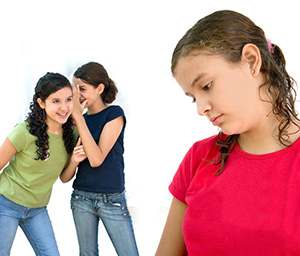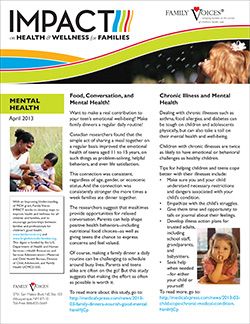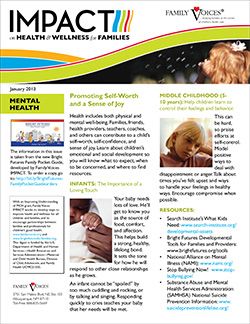
MENTAL HEALTH
SECTIONS: Background ~ Ages and Stages ~ What You Can Do

Health includes both physical and mental well-being. Families, health providers, teachers, coaches, and other community members all work together to build a child’s self-worth, self-confidence, and sense of joy. These important parts of mental and emotional well-being help contribute to healthy, happy families.
Mental Health is a result of:
- Physical Development - When we are physically healthy, it is easier to be emotionally healthy.
- Temperament - Some children are easy-going. Others are not. Understanding a child’s nature makes it easier to prepare for upcoming events and deal with any challenges that may arise.
- Family-Child Interactions - Children sense and react to their family’s moods. If family members are happy, children are more likely to be happy. If there is stress, the child may also be worried or anxious.
- Environmental Factors - Things going on outside of the family’s control can affect a child’s mental and emotional well-being. For example, a child might be worried about school, friends, or moving.
- Other Conditions – A child’s overall mental health can be influenced by any special healthcare needs, including mental, behavioral, emotional health needs.
Just as there are milestones for physical development, the same is true for mental health. Parents want to know that their child is reaching the developmental milestones for social, emotional and mental health. It is helpful for parents to know, for example, that a nine month old may be afraid of strangers, and that two year olds get frustrated when what they want to do and what they can do are not the same. When you know what to expect, you can prepare for each developmental stage. This will also help you know if your child is just moody or is developing a mental health problem. If your child does have a mental illness, it may show up as challenging behavior. Keep in mind, your child isn’t behaving badly on purpose and needs your help and support.
Ages and Stages
- Infancy
The most important way you can ensure the emotional health of your baby is to provide consistent, loving care. Respond to your baby's smiles and coos. Take time to play and interact with your baby everyday. This helps build a strong parent-child bond that will help your child feel secure and loved. As your child grows, this bond will help your child learn how to build relationships with others. It can be challenging to be a loving, patient parent when your baby is fussy or ill, born prematurely or has special healthcare needs. Ask your health providers, family, and friends for help and take care of your own mental health needs. Taking care of yourself is an important part of taking care of your baby. -
Early Childhood
Continue to provide love and guidance for your young child. Play together. Temper tantrums can be part of this stage of development. It is important to be a patient, consistent role model. This is also the age where signs of autism spectrum disorders may appear. If you have any concerns about your child's ability to show affection, pay attention to others, and communicate, talk to your health care provider. It is not unusual for all children to show some of these behaviors. It does not mean your child is autistic. Professional advice can help you sort this out. A health provider can also provide referrals to any special services your child and family need. -
Middle Childhood
Five to 10 year olds show increased understanding of complex ideas. They can manage themselves at school and at home. They are interested in making friends. And, they may meet bullies, who can hurt their self-esteem. Strong family and community ties can help children deal with and avoid bullies. -
Adolescence
Teens are gaining some of the independence of adulthood, but still need help and advice from their families. The teen years can bring serious challenges. Your teen may experience peer pressure. Teens may also try risky behaviors, such as drugs, smoking, and drinking alcohol. Your teen may talk about suicide if she is bullied at school or is under lots of stress. Having trusted adults to talk to can protect teens against some of these risks. Communities can provide safe gathering places and resources, so teens feel welcome, and like they belong. -
Special Needs
There is some evidence that teens with special health needs may be more likely to try risky behaviors. Be alert to changes in your teen's eating and sleeping habits, problems in school, loss of interest in hobbies, or a new crowd of friends. And, keep talking. Show an active interest in your child's life.
What Can Families Do to Promote Mental Health?
Be the constant in your child's life. Listen to your child, and give advice when needed. Celebrate your child's accomplishments. Support your child through difficult times and help your child develop strategies to cope with challenges. Here are some other ways to encourage healthy mental health:
- Take care of your own mental, emotional and behavioral needs. Take time for yourself. Eat healthy foods. Exercise and rest.
- Encourage daily routines so children know what to expect.
- Eat meals together as often as possible.
- Know your children's friends.
- Attend parent meetings at school as often as possible.
- Learn about children's emotional and social development so you will know what to expect and when to be concerned. Talk about your concerns with a health care provider.
- Help your community create resources to encourage mental health
- Work with school adjustment counselors to arrange informational meetings about children's mental, emotional and social well-being
- Start a support group
- Ask your library to put out materials about risky teen behaviors
- Talk to your local police department about educating teens about the dangers of risky behaviors
ADDITIONAL RESOURCES:
Download Project IMPACT
1-page updates:
5 updates found



